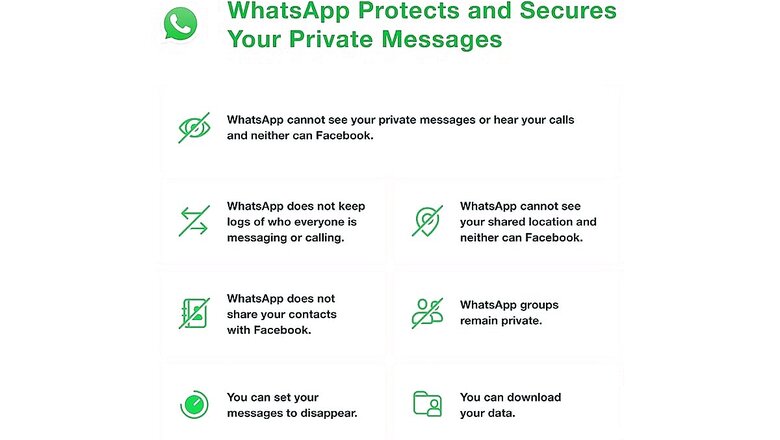
views
After the PR disaster that was the new WhatsApp privacy policy and the terms of service, the Facebook owned instant messaging app has been in damage control mode. That peaked with the new clarification that has officially released and followed up by full page newspaper advertisements in India. WhatsApp keeps insisting on seven main points, but the thing is, the new privacy policy and terms of service cover much more. Let us look at what WhatsApp is saying, and more importantly, what they are not saying at all. The more this unfolds, the more this comes across as a lesson in how to say half-truths while actually never be lying.
Let us first take a look at what WhatsApp is adamant that they do not collect and insist that they are being transparent about user data. First, they say that WhatsApp can neither see your messages or hear your calls on the platform and neither can Facebook. Secondly, they insist that they do not keep a log of who the users are messaging or calling. Third, they say that WhatsApp does not share your contacts with Facebook. Fourth, they insist WhatsApp cannot see your shared location and neither can Facebook (a bit more on this later). Fifth, they say WhatsApp groups remain private. Sixth, they say you can download your WhatsApp data (how this makes any sense is beyond me, but I do admit I don’t know everything. Last but not least, WhatsApp says that you can set your messages to disappear.
Let us pick some contradictions within these broad clarifications. Why would WhatsApp be suggesting the disappearing messages when they insist that they cannot, and neither can Facebook, read anything that I’m sending to friends or they are sending me? If all the data is secure, and chats are encrypted away from any prying eyes, that should be that? It doesn’t make sense to be suggesting both sides of the coin. If this is to save us from ourselves, then its another matter altogether. Secondly, WhatsApp keeps insisting that no call data or message data can be accessed by WhatsApp or Facebook. Then again, that was never really the cause for concern, was it? When the new privacy policy rolled out as an optionally mandatory ‘accept’, the concern revolved around the larger use of user data which WhatsApp has access to and says that they will share with Facebook and other businesses as well.
Debunking Location data claims: WhatsApp says that “when you share your location with someone on WhatsApp, your location is protected by end-to-end encryption, which means no one can see your location except the people you share it with.” Okay, understood. A quick glance over at the new WhatsApp Privacy Policy document, under the Automatically Collected Information, says, “We collect and use precise location information from your device with your permission when you choose to use location-related features, like when you decide to share your location with your contacts or view locations nearby or locations others have shared with you. There are certain settings relating to location-related information which you can find in your device settings or the in-app settings, such as location sharing.” Isn’t this exactly contrary to what the clarification says? How can it be both of ‘no one can see your location’ and ‘we collect and use precise location information like when you decide to share your location with your contacts’?
In the same point, WhatsApp says, “Even if you do not use our location-related features, we use IP addresses and other information like phone number area codes to estimate your general location (e.g., city and country). We also use your location information for diagnostics and troubleshooting purposes.”
There you go. You thought you were smart and disabled location data access on your phone? WhatsApp will still find a way. They claim it is for just diagnostics and troubleshooting. Theoretically, WhatsApp can share even this collected data with Facebook—but we don’t know if it does. Or doesn’t.
Debunking “We don’t keep logs of who everyone is messaging or calling”: WhatsApp says they don’t know who you are messaging or calling on the platform. “While traditionally mobile carriers and operators store this information, we believe that keeping these records for two billion users would be both a privacy and security risk and we don’t do it,” says the WhatsApp clarification. Yet, WhatsApp gets very close. They may try to portray it as that, but they actually do collect a lot of your usage and log information.
“We collect information about your activity on our Services, like service-related, diagnostic, and performance information. This includes information about your activity (including how you use our Services, your Services settings, how you interact with others using our Services (including when you interact with a business), and the time, frequency, and duration of your activities and interactions), log files, and diagnostic, crash, website, and performance logs and reports. This also includes information about when you registered to use our Services; the features you use like our messaging, calling, Status, groups (including group name, group picture, group description), payments or business features; profile photo, “about” information; whether you are online, when you last used our Services (your “last seen”); and when you last updated your “about” information,” is how the privacy policy document describes it.
WhatsApp may not know what you are messaging someone, but they do have a fair idea of how you are using the app. And that will likely include the most connected with contacts too. That’s how the magic of personalization is built and served.
Silence on data sharing with Facebook: WhatsApp makes the clarification that they do not share your contacts with Facebook, and neither can Facebook see your location data. That again, is a half-truth.
WhatsApp privacy policy document makes it clear that they do share a lot of your information with other Facebook companies. “We may use the information we receive from them, and they may use the information we share with them, to help operate, provide, improve, understand, customize, support, and market our Services and their offerings, including the Facebook Company Products,” say the updated terms of service. Some of the listed utilities for this data sharing are believed to help in improving infrastructure and delivery systems, understanding how a user uses the platforms differently and also promote data safety and security across the board. Mind you, this also means that your data will be used to serve personalized suggestions as well as advertisements targeted at you and your usage trends across a variety of platforms.
The WhatsApp updated terms say this is for “improving their services and your experiences using them, such as making suggestions for you (for example, of friends or group connections, or of interesting content), personalizing features and content, helping you complete purchases and transactions, and showing relevant offers and ads across the Facebook Company Products.”
If you are wondering what Facebook Company Products mean, we’ll let Facebook explain it anyway—” Facebook Products include Facebook (including the Facebook mobile app and in-app browser), Messenger, Instagram (including apps such as Boomerang), Portal-branded devices, Oculus Products (when using a Facebook account), Facebook Shops, Spark AR Studio, Audience Network, NPE Team apps and any other features, apps, technologies, software, products or services offered by Facebook Inc.”
The thing is, WhatsApp has been on a PR recovery mission ever since the new privacy policy rolled out a few days ago caused a lot of concern among WhatsApp users. The seven points they seem insistent on repeating may very well be the truth, but it is not the whole truth. The focus seems to be on insisting that your chats and your location data is safe and isn’t shared with Facebook. What isn’t being talked about is what other data is being shared with Facebook and the Facebook Company Products, under the garb of improving services, personalizing suggestions, customizing features and content as well as serving you uncannily precise advertisements that you may see on Facebook or Instagram. The right answers for the wrong questions.
No wonder WhatsApp is worried by the winds of change. The more privacy focused Telegram and Signal instant messaging apps have been at the right place at the right time to welcome users concerned by the way WhatsApp may be handling their data. Telegram has now clocked 500 million active users globally. While that is a significant milestone in itself, the bigger highlight perhaps is that 25 million new active users have joined the privacy focused Telegram in the past 72 hours, to push the user base beyond the 500 million mark. At this time, Telegram is the second most popular app on the Apple App Store for iPhone users, behind Signal. WhatsApp has been pushed down to third, though the latest numbers suggest WhatsApp is still being downloaded in large numbers.
Read all the Latest News, Breaking News and Coronavirus News here


















Comments
0 comment